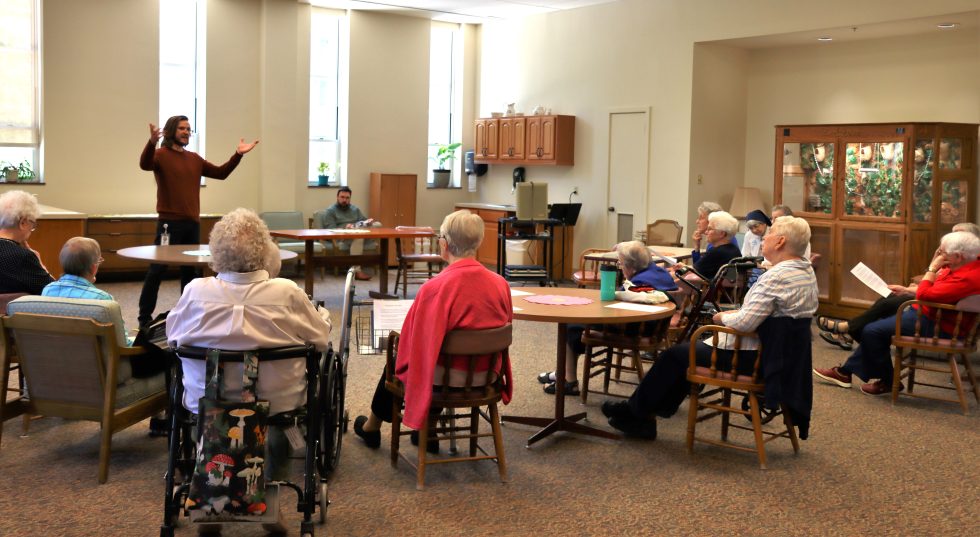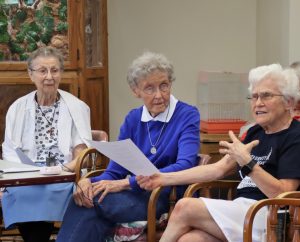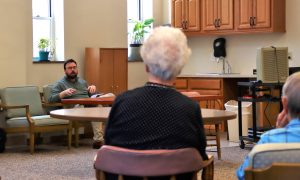In a thought-provoking discussion led by Nick Keehler, Community Engagement Coordinator for the Justice, Peace, and Integrity of Creation (JPIC) Office, some Sisters of Charity of Leavenworth gathered to reflect upon the powerful documentary, “The Letter: a Message for Our Earth.” The documentary sheds light on the urgent issue of climate change and its profound impact on communities around the world. Throughout the discussion, the Sisters shared their observations and highlighted the need for increased awareness, dialogue, and action to address this global crisis.

“The Letter” gets its name from Pope Francis’ encyclical, Laudato Si’, which introduces the concept of Integral Ecology, an inclusive approach to addressing the environmental crisis. Recognizing the interconnection between human beings, the natural world, and social systems, it emphasizes the need for holistic solutions that integrate environmental, economic, and social concerns. This comprehensive framework resonated deeply with the Sisters, inspiring them to explore how to actively contribute to its realization on a local level.
Dialogue

Sister Paula Rose Jauernig opened the discussion by acknowledging the significant challenge in spreading awareness about Integral Ecology. Expressing concern over the presence of educated scientists who deny its existence, she recognized difficulties in disseminating crucial information about climate change. Nick Keehler responded that denial of science by educated people causes one to wonder what narratives these individuals have been exposed to that have led them to such skepticism. Reflection on those possible narratives can become a catalyst for understanding the importance of countering misinformation through open dialogue.
Engaging in dialogue about Integral Ecology resonated with the Sisters. The group recognized the transformative power of conversation and the importance of respecting differing perspectives. “An open heart and mind and a willingness to engage even when confronted with differing beliefs are essential qualities necessary for fruitful dialogue,” said Sister Therese Zimmerman.
Solidarity
Reflecting on the Sisters’ systemic change grants, Sister Therese Bangert stressed the significance of actively listening to the voices of those directly impacted by climate change. While progress has been made, there is a pressing need to hear more from those affected, understanding their unique experiences and challenges. Sister Paula Rose shared a past example of the Sisters’ contributions to projects in Uganda, which have provided water filters to combat the effects of climate change. Such actions demonstrate the transformative power of solidarity and highlight the importance of amplifying marginalized voices.

Yet, there is a challenge in building relationships with organizations supported through donations from the SCL Community. JPIC Coordinator John Shively said the JPIC Office and Change Grant committee must explore how they could further support and establish genuine connections with these communities. This inquiry sparked a meaningful conversation about the importance of sustained engagement, collaboration, and support that goes beyond financial assistance. It underscored the Sisters’ desire to foster true relationships and stand in solidarity with those affected by climate change.
Intentionality
Intentionality emerged as a crucial aspect of the Sisters’ future actions, as Sister Therese Zimmerman stressed the need to be intentional in speaking out about climate change. She acknowledged that it has not been a major priority for some Catholic leaders, making it all the more essential for the Sisters to actively address the issue. On a related note, Sister Mary Pat Murray echoed this sentiment, emphasizing the necessity of the SCL Community educating themselves about migrants coming to the US to foster understanding and empathy.
Seeking opportunities to influence those in positions of power and support their initiatives is an important part of creating change in environmental policy. Sister Ann Barton said that by engaging with policymakers and sharing the message of Laudato Si’, the Community can amplify their impact.
Sister Paula Rose suggested engaging University of Saint Mary (USM) students, encouraging their passion for ecology and inspiring them to take action. By nurturing their love for the environment and instilling a sense of responsibility, the Sisters can cultivate a new generation of environmental stewards who will contribute to positive change in their local community of Leavenworth. By equipping the youth with knowledge, tools, and the ability to effectively communicate these urgent matters, the Sisters can empower them to be ambassadors for change and catalysts for a sustainable future.
As the discussion drew to a close, the group emerged with a renewed sense of purpose and urgency. Their conversation echoed the call for action, recognizing the critical need for Integral Ecology in safeguarding our planet. United in a desire to care for our Earth and its inhabitants, the discussion encouraged participants to embark on a journey to embody Integral Ecology in their lives, work, and relationships, inspiring others to join them in this collective endeavor for a better world.